nn
n
n The transformation of asparagus into sparrow-grass,nas mentioned yesterday, is understandable and this has led me to think aboutnother words that have altered over time, often disguising their origins. Take,nfor example, the name of one of our commonest flowers – the dandelion.
n
n
n
 |
| Dandelion |
n
n
n
nIt would be perfectly understandable to assume that this name is a compound of dandynand lion, with dandy denoting something showy or fancy (as in YankeenDoodle Dandy), and lion relating to the big cat – hence a bright,nshowy flower with a fine leonine mane of petals. Except it isn’t. The namenactually derives from the shape of the leaves, which have tooth-likenindentations along their edge, called in French dent de lion (Lion’sntooth), and in mediaeval Latin dens lionis. In fact, in England, thenplant was once called piss-a-bed, a reference to the diuretic propertynof the plant.
n
n
n
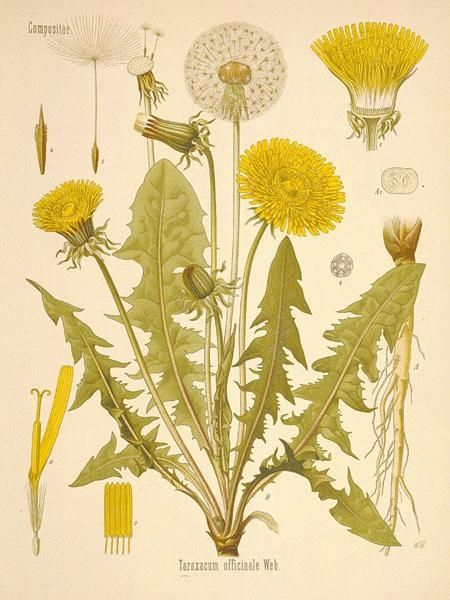 |
| Dandelion |
n
n
n
nTurning to another plant, the artichoke, this name comes throughnthe Italian articoccio, the French artichault and Spanish alcachofa,nall from the Arabic harsaf, harziaf and harsciaf. When folknetymology gets to work, there are derivations invented that link the word to arcin– arch (great), and cloffo – horse-collar, other place thenword in hearty and choke, either something that chokes thenheart or sticks in the throat; or something with a choke, or a chock,nat its heart. Other theories turn to the French, with haut – high,ngreat, and chaud – heat, warm, or even changing the chaunto chou – cabbage.
n
n
n
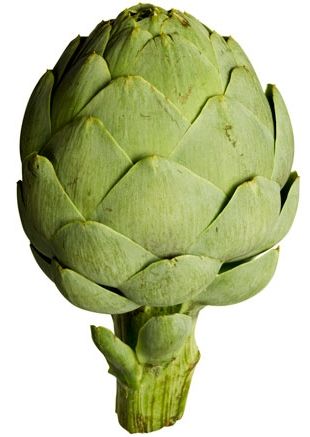 |
| Artichoke |
n
n
n
nThe Romans ate artichokes (it’s just that wendon’t know which bits of them), and called them carduus, a cover-all word fornthistles, and from which we get the word cardoon, the modern word fornthe wild or uncultivated artichoke. Sharing a name, and distantly related, isnthe Jerusalem artichoke, which you might be forgiven for thinking comes fromnthe Holy Land. Nope. Afraid not. The name is a corruption on the Italian namenof the plant – girasole artichoke – gira al sole meaning sun-flower,nand with the usual English gift for garbling foreign languages this became Jerusalem.
n
n
n
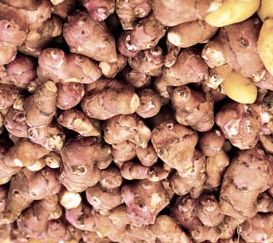 |
| Jerusalem Artichokes |
n
n
n
nThere is a story that, when the Crystal Palace was being built, a large numbernof sparrows became trapped inside, roosting in the trees and beams, andnthreatening to besmirch the visitors with their copious droppings. Variousnsolutions were attempted to rid the Great Exhibition space of the unwantednvisitors, all to no avail, until things got so bad that there was only onenalternative – consult the Duke of Wellington. Old Nosey turned up, took onenlook, and provided the answer –
n
n
n
n“Try sparrow-hawks.”n
n
n
nSo, sparrow-hawks,nhawks that hunt sparrows, right? Wrong. It comes from spar-hawk, sparnis an old word for rock (as in feldspar or fluorspar), and the bird is anrock-hawk (another name for the pigeon is rock-dove).
n
n
n
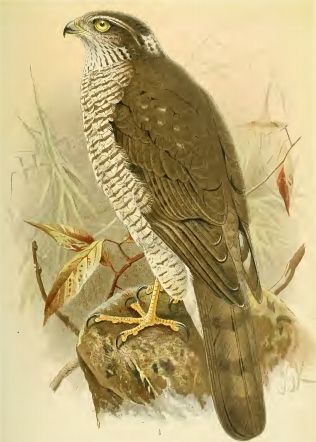 |
| Sparrow-Hawk |
n
n
n
nStayingnwith birds, we talk about larks and larking around, meaning fun and foolingnabout, it’s common enough in Dickens,
n
n
n
n‘We should be as gay as larks’n
n
n
nsays Mr Brass, in The Old Curiosity Shop. It makes sense, we are asncarefree as the merry bird of dawn, singing and gambolling with no thought ofntomorrow. But lark is a corruption of laik, a common enough wordnin northern English dialects (I use itnmyself frequently), which comes from Old English lāk and the Anglo Saxon lác, meaning tonsport, to play or simply to mess about.
n
n
n
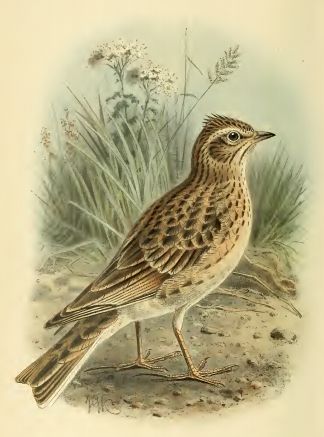 |
| Lark |
n
n
n
nI hope you are never troubled with thrush,nthe fungal infection oral candidiasis, but can there possibly be a linknto the bird? Yes, there is – thrush, the bird, takes its name from throstle,na name still used in northern England, from Anglo Saxon þrosle; thendisease takes its name from þrot-swyle – throat swelling, with annold name for the wind-pipe being þrot-bolla, throte-bolle, whichnwe find in Chaucer,
n
n
n
n“And by the throte-bolle he caught Alein.”n
n
n
n
n
 |
| Thrush |
n
n
n
nTo returnnto foodstuffs, you may be familiar with the term forcemeat, which isnused to make pates, quenelles, sausages, roulades and galantines. So, does thenname come from the action of forcing the meat into a skin or a mould, orndoes it come from the forcing, or concentrating, of flavour in the meat?nWell, it’s neither. Originally, the word was farced-meat, from thenFrench farcer, to chop or mince. And by the by, the name of hash,nas in corned beef hash, does not come from hash, as in to make a hash ofnsomething, a mess or lumping together, but again from the French hacher,nto chop or mince.
n
n
n
 |
| Minced Meat |
n
n
n
nApple-pie order, meaning the opposite of a hash andnreferring to something that is perfect and proper, has nothing to do with foodnand derives from the French too, cap-à-pie is a term applied to ansoldier fully caparisoned from head to foot; the schoolboy prank of the apple-pienbed, were the sheets are rearranged to bring the top and the bottom closerntogether, also comes from the head to toe idea.
n
n
n
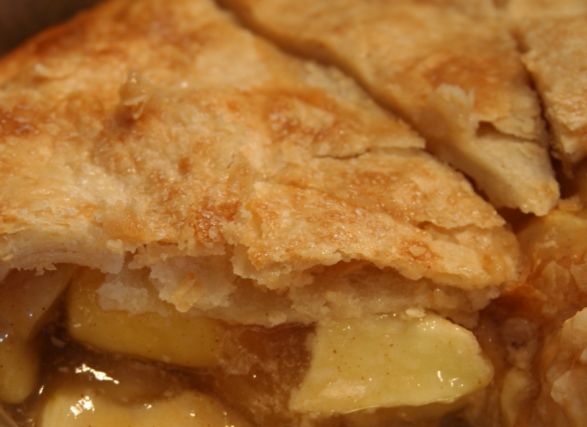 |
| Apple Pie |
n
n
n
nSpeaking of tops and bottomsnbrings me to the bitter end – not as you’d think referring to the dregsnof something, the sour remains that have been left over, the part that mightnleave a bitter taste in the mouth. The bitts (or bits) are spars to the fore ofna sailing ship, around which bights, chains or cables are secured, and whennthese ropes are played out (as when an anchor is lowered), the part thatnremains aboard the vessel is the bitter’s end, changed in time to the bitternend, the end of a rope where no more remains to be played out.
nnn
n
n
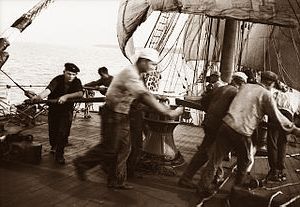 |
| Playing it out to the bitter end |
n
n
nnn
n
nnn
